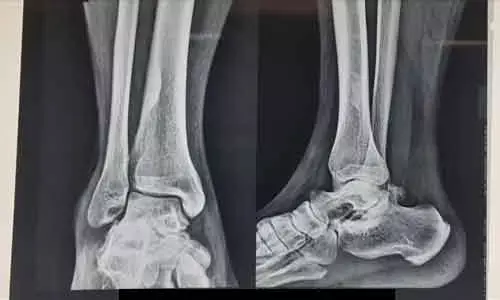- Home
- Medical news & Guidelines
- Anesthesiology
- Cardiology and CTVS
- Critical Care
- Dentistry
- Dermatology
- Diabetes and Endocrinology
- ENT
- Gastroenterology
- Medicine
- Nephrology
- Neurology
- Obstretics-Gynaecology
- Oncology
- Ophthalmology
- Orthopaedics
- Pediatrics-Neonatology
- Psychiatry
- Pulmonology
- Radiology
- Surgery
- Urology
- Laboratory Medicine
- Diet
- Nursing
- Paramedical
- Physiotherapy
- Health news
- Fact Check
- Bone Health Fact Check
- Brain Health Fact Check
- Cancer Related Fact Check
- Child Care Fact Check
- Dental and oral health fact check
- Diabetes and metabolic health fact check
- Diet and Nutrition Fact Check
- Eye and ENT Care Fact Check
- Fitness fact check
- Gut health fact check
- Heart health fact check
- Kidney health fact check
- Medical education fact check
- Men's health fact check
- Respiratory fact check
- Skin and hair care fact check
- Vaccine and Immunization fact check
- Women's health fact check
- AYUSH
- State News
- Andaman and Nicobar Islands
- Andhra Pradesh
- Arunachal Pradesh
- Assam
- Bihar
- Chandigarh
- Chattisgarh
- Dadra and Nagar Haveli
- Daman and Diu
- Delhi
- Goa
- Gujarat
- Haryana
- Himachal Pradesh
- Jammu & Kashmir
- Jharkhand
- Karnataka
- Kerala
- Ladakh
- Lakshadweep
- Madhya Pradesh
- Maharashtra
- Manipur
- Meghalaya
- Mizoram
- Nagaland
- Odisha
- Puducherry
- Punjab
- Rajasthan
- Sikkim
- Tamil Nadu
- Telangana
- Tripura
- Uttar Pradesh
- Uttrakhand
- West Bengal
- Medical Education
- Industry
Total ankle replacement better than ankle arthrodesis for severe ankle arthritis patients: Study

USA: Total ankle arthroplasty (TAA) provides better long-term function than ankle arthrodesis (AA) in patients with end-stage ankle arthritis, according to a recent study in the Journal of Bone & Joint Surgery.
The study found that patients who underwent TAA or AA showed significant improvement in overall function, ankle-specific function, and pain at 48 months after surgery, with better functional improvement in the TAA group.
"Both established treatments for end-stage ankle arthritis are effective at pain relief and improved patient-reported outcomes," according to the research by Bruce Sangeorzan MD, and colleagues at the University of Washington and VA Puget Sound Health Care System. "However, it appears TAA leads to greater improvement in most patient-reported outcome measures at 48 months after surgery."
Study adds to evidence supporting TAA for ankle arthritis
End-stage ankle arthritis is characterized by complete loss of cartilage and "bone-on-bone" contact in the ankle joint, with patients experiencing pain and stiffness. The standard treatment for end-stage ankle arthritis is arthrodesis, which uses hardware such as plates and screws to fuse the ankle bones into a single piece.
However, in recent years, TAA has become a popular alternative. In TAA, a prosthesis is used to replace the deteriorated ankle joint - similar to how artificial joints are used in total hip or knee replacement surgery. However, questions remain regarding the results of TAA versus AA, especially in the long term.
Dr. Sangeorzan and colleagues compared the outcomes of the two procedures in 517 patients with end-stage ankle arthritis at six medical centers. Patients were treated according to their preferred procedure, with 414 undergoing TAA and 103 undergoing AA. All operations were performed by orthopaedic surgeons with extensive experience with each procedure, as well as hip and knee replacement and surgery for other deformities around the ankle.
At four years postoperatively, both procedures yielded showed improvements in key patient outcomes. By most measures, long-term results were better for patients undergoing TAA compared with AA, including patient-reported ankle function for activities of daily living and sports, as well as physical aspects of quality of life.
Through the first three years postoperatively, pain scores were also better after total ankle replacement. For example, average pain score (on a 0-to-10 scale) decreased from 6.3 to 1.9 in the TAA group versus 6.0 to 2.5 in the AA group. For both treatments, the improvements observed at two years postoperatively were maintained through four years postoperatively.
Seventy-eight percent of patients who underwent TAA were "completely satisfied" with the results of their surgery, compared to 60 percent of those who underwent AA. Patients who underwent TAA also had a lower rate of revision surgery: 8.7 versus 17.5 percent.
Although the study was designed as a randomized trial with a patient preference arm, too few patients were willing to be randomized, and the trial was converted to a prospective cohort study. According to coauthor Dan Norvell, PhD, the researchers controlled for the effects of potential selection bias in their analysis by evaluating and adjusting for unevenly distributed patient characteristics between treatment groups.
The findings are "highly relevant" to patients and surgeons during the planning stage when treating severe ankle arthritis, Dr. Sangeorzan and coauthors believe. They plan to perform further analyses to report the rates and risk factors for revision surgery for the two procedures with a longer follow-up period.
Reference:
The study titled, "Comparing 4-Year Changes in Patient-Reported Outcomes Following Ankle Arthroplasty and Arthrodesis," is published in the Journal of Bone & Joint Surgery.
DOI: https://www.jbjs.org/reader.php?id=208911&rsuite_id=2876410
Hina Zahid Joined Medical Dialogue in 2017 with a passion to work as a Reporter. She coordinates with various national and international journals and association and covers all the stories related to Medical guidelines, Medical Journals, rare medical surgeries as well as all the updates in the medical field. Email: editorial@medicaldialogues.in. Contact no. 011-43720751
Dr Kamal Kant Kohli-MBBS, DTCD- a chest specialist with more than 30 years of practice and a flair for writing clinical articles, Dr Kamal Kant Kohli joined Medical Dialogues as a Chief Editor of Medical News. Besides writing articles, as an editor, he proofreads and verifies all the medical content published on Medical Dialogues including those coming from journals, studies,medical conferences,guidelines etc. Email: drkohli@medicaldialogues.in. Contact no. 011-43720751


